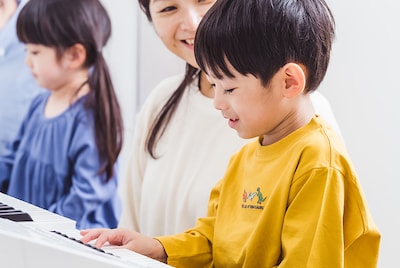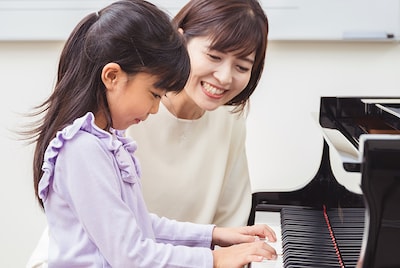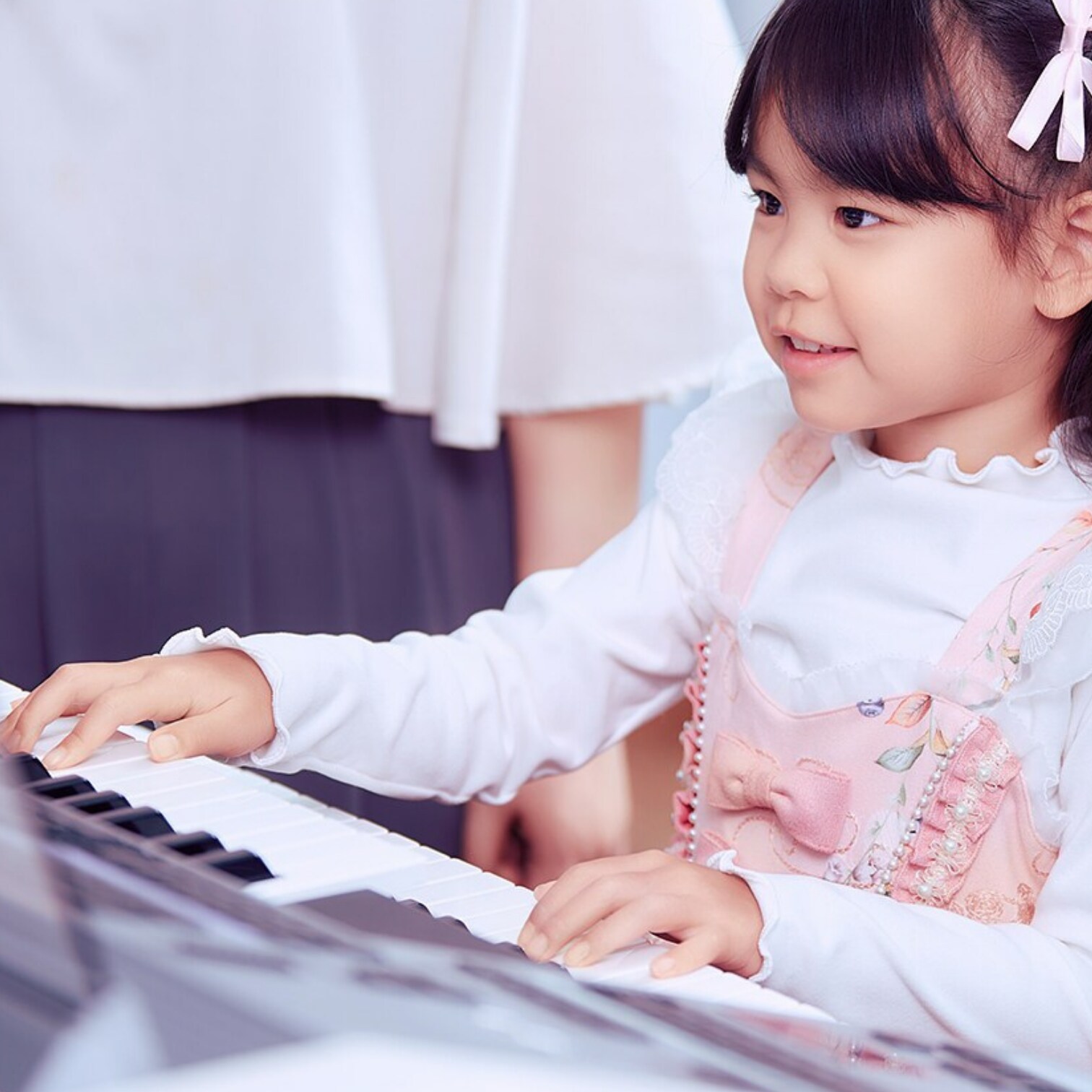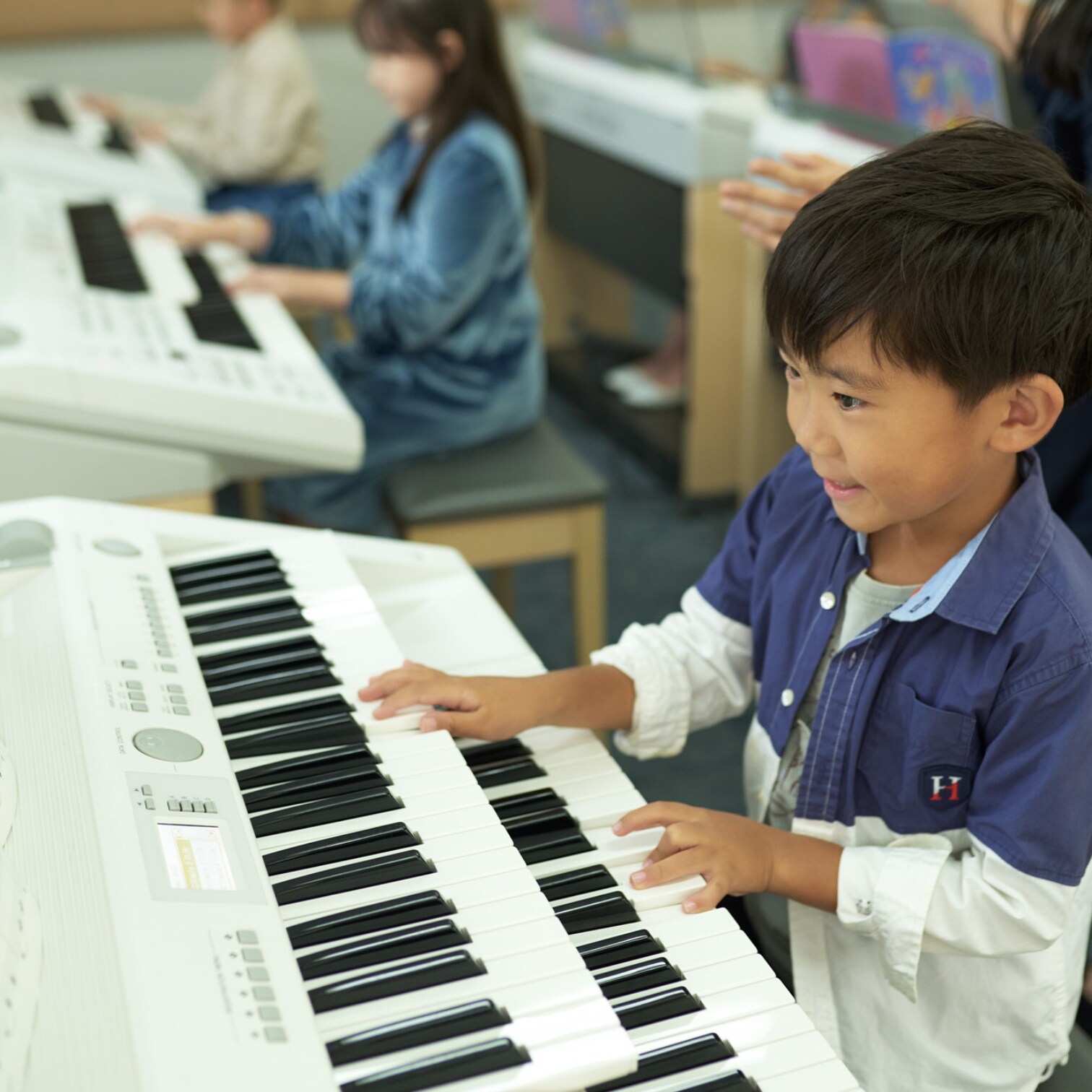Yamaha Primary Course (Explorer) for 3-year-olds:
Lessons to Build a Foundation for Piano and All Musical Performance
Yamaha Primary Course (Explorer) for 3-year-olds: Lessons to Build a Foundation for Piano and All Musical Performance
A music course specially designed for 3-year-olds.
Make music a gift for a lifetime! Through Piano and Electone playing, we foster the ability to enjoy music freely and creatively.
Ages 3 to 5.5: A Significant Growth Period!
3-year-old children have vivid imaginations. By ages 4 and 5, they develop the ability to discern music through hearing skills. In Yamaha’s lessons, children will expand their imagination through music while nurturing their musical sensibility.
Let’s explore an actual lesson and uncover its key features!
Yamaha’s "Timely Education" Fosters the Development of Skills During Optimal Growth Period
Children experience periods of significant development in specific abilities. By tailoring lessons to align with a child’s growth stage, Yamaha maximises the enhancement of skills that naturally flourish at that age.
What Are the Benefits of Starting Music Education at Age 3?
At 3 years old, children enter a unique phase where they immerse themselves in imaginative worlds and begin expressing themselves with confidence. Providing rich exposure to quality music during this time ensures they can express themselves freely and confidently in the future.
Age 3 is the ideal time to start! Now is the perfect opportunity to surround them with enriching music experiences and let them fully enjoy the journey.
In the Yamaha Primary Course (Explorer) for 3-year-olds, children not only listen to and sing songs from various genres while visualising imagery but also have fun playing the piano or Electone with playful elements integrated into the lessons. We highly recommend starting this journey at age 3 for families who wish for their children to cherish music as a lifelong treasure and aspire for them to become proficient musicians.
"Playing" at Age 3: Developing Personal Imagery and Self-Expression
When it comes to playing a musical instrument, adults often focus on technical skills like finger dexterity or score reading. However, Yamaha Music School believes that "playing" goes beyond these abilities. It emphasises having a personal vision of "how you want to play" and being able to perform with feeling while carefully listening to the sound. Accumulating stress-free "playing" experiences leads to a unique and expressive performance style.
Features of the Yamaha Primary Course
Yamaha’s distinctive teaching method equips children with the ability to enjoy music throughout their lives, even as adults.
Over 3 years, children engage with more than 140 songs. A defining feature of the Yamaha Primary Course is Yamaha’s unique method, where children learn each song through four steps: “Listening,” “Singing,” “Playing,” and “Reading.” Using keyboard instruments like the Piano or Electone, we nurture fundamental musical skills and the ability to express oneself freely.

Social Skills, Perseverance, and Concentration Developed Through Yamaha Lessons
In addition to mastering keyboard skills, children cultivate “non-cognitive skills” such as cooperation, social skills, perseverance, and concentration through Yamaha’s lessons.

Instruction by Certified Yamaha Teachers Ensures Consistent Skill Development
Yamaha-certified teachers possess extensive musical knowledge and excellent communication skills with young children, ensuring high-quality instruction.

Comprehensive Tools to Support Practice at Home
Yamaha provides various innovative tools to support home practice. These include videos highlighting key practice points and apps designed to make practice engaging and enjoyable.
(The "App" is available for the "Yamaha Primary Course for 4-5.5-Year-Olds" only.)
Achievement in 3 years
- Skills
- After 6 months
- After 1 year
- After 2 years
- After 3 years
-
Listening
- Feel the rhythm and move their body to the music
- Listen to the music and recognise characteristics of the music (soft, energetic, etc.)
- Identify sounds they hear using solfege names (Do Re Mi etc.)
- Identify melodies and harmonies using solfege names
-
Singing
- Have fun singing along with music data and teachers' live accompaniment
- In addition to the lyrics, they can sing using solfege names (Do Re Mi etc.)
- They can imitate the teacher's singing, including sounds and rhythms
- They can feel the mood of song and sing expressively, while paying attention to the pitch
-
Playing
- Through creative approaches, they learn about high/low pitches, and the structure of the keyboard
- Play with the right hand using "Do Re Mi"
- They can play complete repertoire with both hands
- They can play repertoire in various keys, experience ensemble playing with their friends and learn simple arrangement
-
Reading
- Able to follow music score of the repertoire with good flow
- They can read the scores of the repertoire learnt
Lesson Details
Yamaha Primary Course (Explorer) for 3-year-olds
Age Range
・ 3 Years Old
Course Duration
・ 3 Years
Lesson Style
・ Group lessons
No. of Lessons
・ 11 Lessons Per Term (3 Months)
* 9 Curriculum Sessions + 2 Integrated Review Sessions
Lesson Duration
・ 50 Minutes
Course Commencement
・ January, April, July, and October
Enrollment Frequency
・ Monthly
Course Fees
| Yamaha Primary Course | ||||
| Level | Lesson Duration | Level Duration | Termly Course Fee (3 months) |
Remarks |
| 1st Year (Primary 1) | 50 Mins | 1 Year | $534 | $36 off per term for weekday classes |
| 2nd Year (Primary 2) | 50 Mins | 1 Year | $534 | |
| 3rd Year (Primary 3) | 50 Mins | 1 Year | $564 | |
* All fees are inclusive of 9% GST.
* Non-refundable registration fee of $60 (including GST)
* Fee payment upon registration is via Cash, Cheque or NETS, subsequent course fees is to be paid by GIRO.
* For non-GIRO students, a refundable deposit of $150.00 is required.
* All fees are subjected to changes.
* Group Size: 5 - 10 pax
Material Fees
・ Go to material fee list for information.
Schedule
・ Go to Course Schedule page for information.
Available Location
Locate Us
Voice of the Expert
One key term in early childhood education is 'self and social competence'. "Self competence" encompasses self-esteem, self-affirmation, motivation, the ability to control one's actions, and perseverance.
The sense of "I can do it if I try!" becomes a fundamental source of children's confidence throughout their future, making the early years crucial in shaping their experiences. The age of three is a significant period when children explore their interests by engaging in various experiences, asking themselves, "What possibilities do I have?". Another aspect of "social competence" is the ability to navigate interactions effectively with others. When a child encounters someone who plays an instrument better, it can foster a desire for improvement and internal motivation, leading to a sense of wanting to play better and produce beautiful sounds. When playing with others, children naturally listen attentively to different sounds. In essence, music facilitates mutual understanding, empathy, and compassion. Furthermore, the remarkable aspect of music is its impact on the brain-listening to music involves processing information and various interpretations, fostering cognitive development. Engaging passionately with music not only brings joy but also nurtures intellectual growth.
• Professor Toshihiko Endo:
• Professor at the Graduate School of Education, The University of Tokyo, and also serves as the Director of “CEDEP”, i.e. the Center for Early Childhood Development, Education, and Policy Research, an affiliated institution of the university. His areas of expertise include developmental psychology, emotional psychology, evolutionary psychology.
Explore Our Individual Lessons (Optional)
Supplementary Individual Lessons for an Enhanced Musical Experience!
In addition to the unique experiences offered in group lessons, supplementary individual lessons provide personalised instruction in playing and reading. With meticulous support tailored to each child, these lessons enhance the overall group lesson experience.
(The basic format is 'group lessons.' Supplementary individual lessons are optional.)

Lesson Details
No. of Lessons
・ 11 Lessons Per Term (3 Months)
Lesson Duration
・ 30 Minutes
Fees
・$168 per month (*$12 off per month for weekday classes.)
Q&A
Yamaha emphasizes comprehensive musical development for young learners.
Private piano lessons focus mainly on reading and playing music, our curriculum encompasses "listening, singing, playing, reading, and creating," with the goal of cultivating music skills effectively.
Our approach lays the foundation for acquiring strong musical skills.
The concept of the Yamaha Primary Course is "I can play more. I can listen more."
This course is an integration of the music programs for the 3-5 year olds, and it includes some restructuring, updating and some refreshing new music content and digital educational materials.
In addition, there is an option to supplement with individual lessons, should the need arise.
At the start of the program, homework involves listening to the music and watching videos. Gradually playing of the instruments will be required.
"Reviewing" the lesson content at home will result in high level of confidence and sustain motivation and interest.
Homework in the colourful workbook is also assigned. With stickers and fun crafts, children can learn the elements of music in various creative ways.
The entire Yamaha Primary Course curriculum consists of 140 songs in various keys with both hands. This number includes the pieces for the Supplementary Individual Lessons.
They will be taught repertoire in various styles, learning to play with both hands together in 5 different keys.
The ability to feel the nuances and to play with appropriate expression will be taught.
It would be ideal to have an instrument by the end of the first textbook of PRIMARY 1.
A piano or Electone is most recommended, considering tone colour, range and playing posture. A Yamaha portable keyboard could be the next best choice.
A Yamaha digital piano with consistent keyboard touch is another possible option.
Yes, since they are 3 years old, parents' attendance in lesson is required. Your presence will provide valuable emotional support.
When the children are able to learn independently at the latter stage of 4/5 years old, parents' attendance in the lesson will be optional.
We kindly request that younger children do not enter the lesson room. This is to provide a focused environment for maximum benefit.







